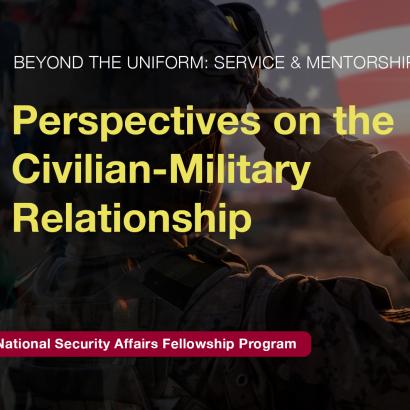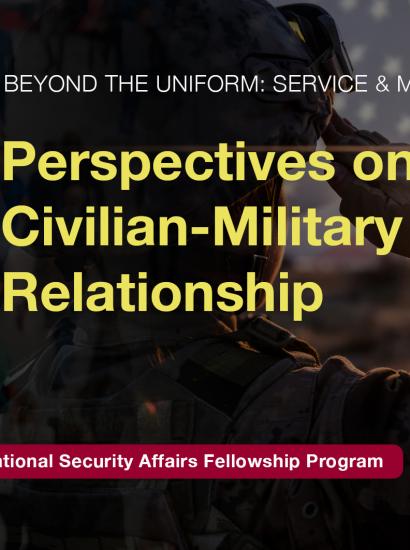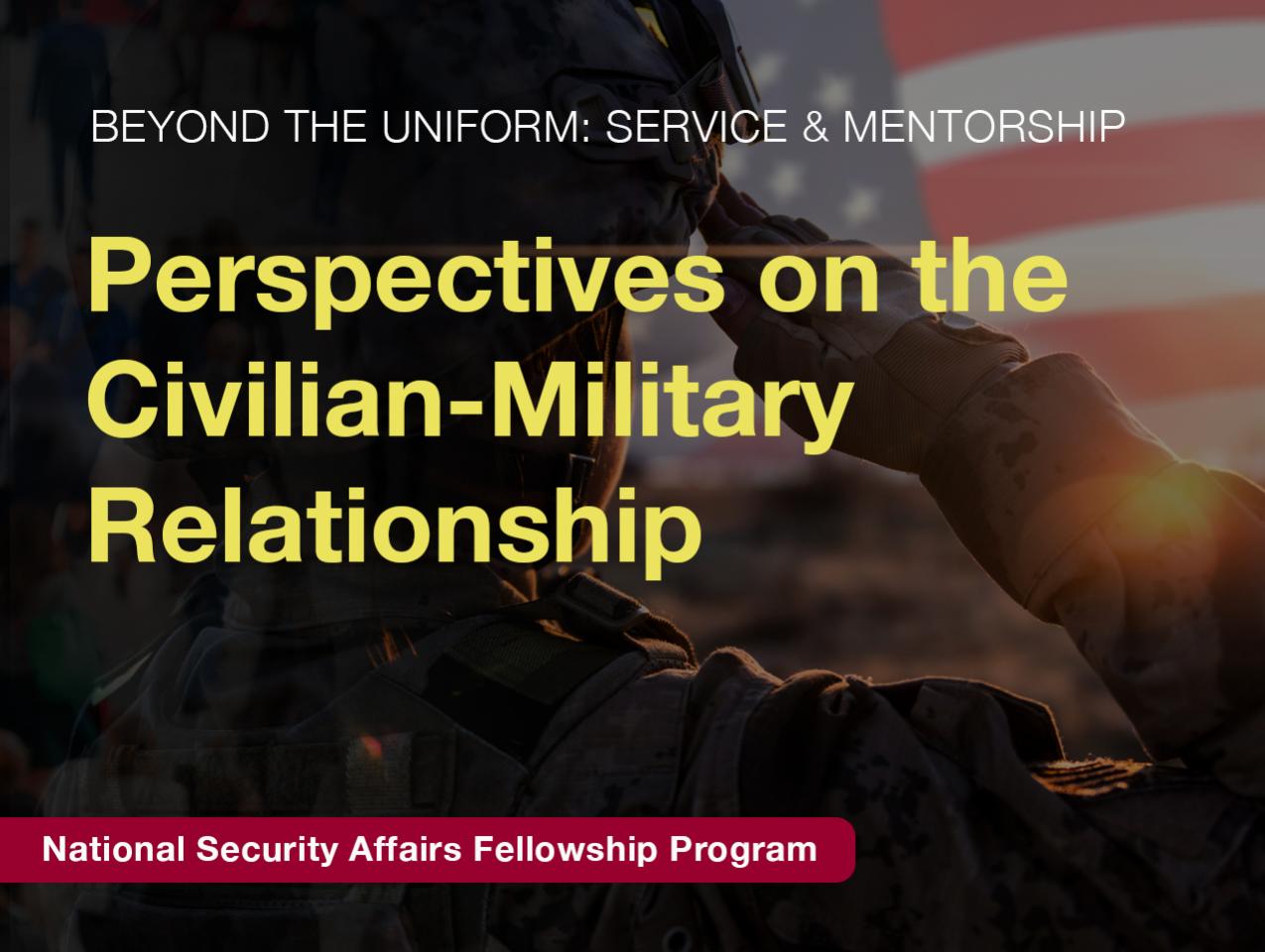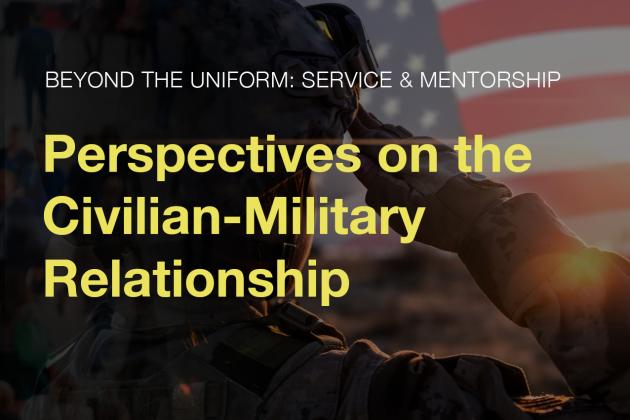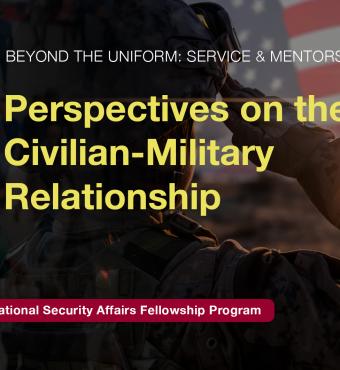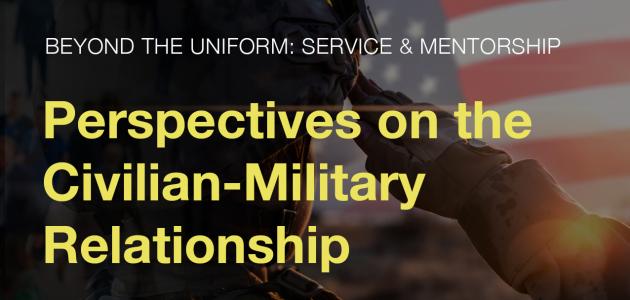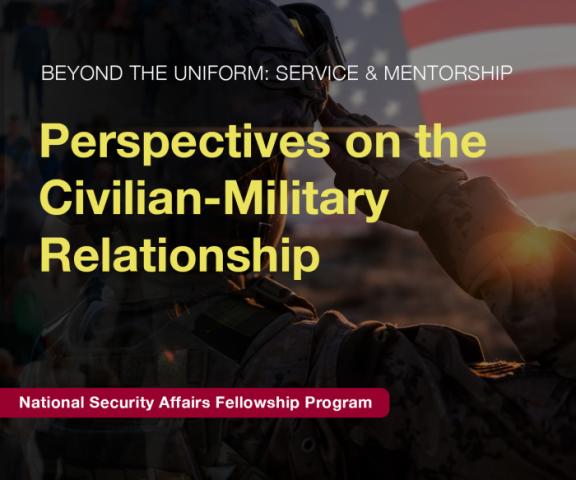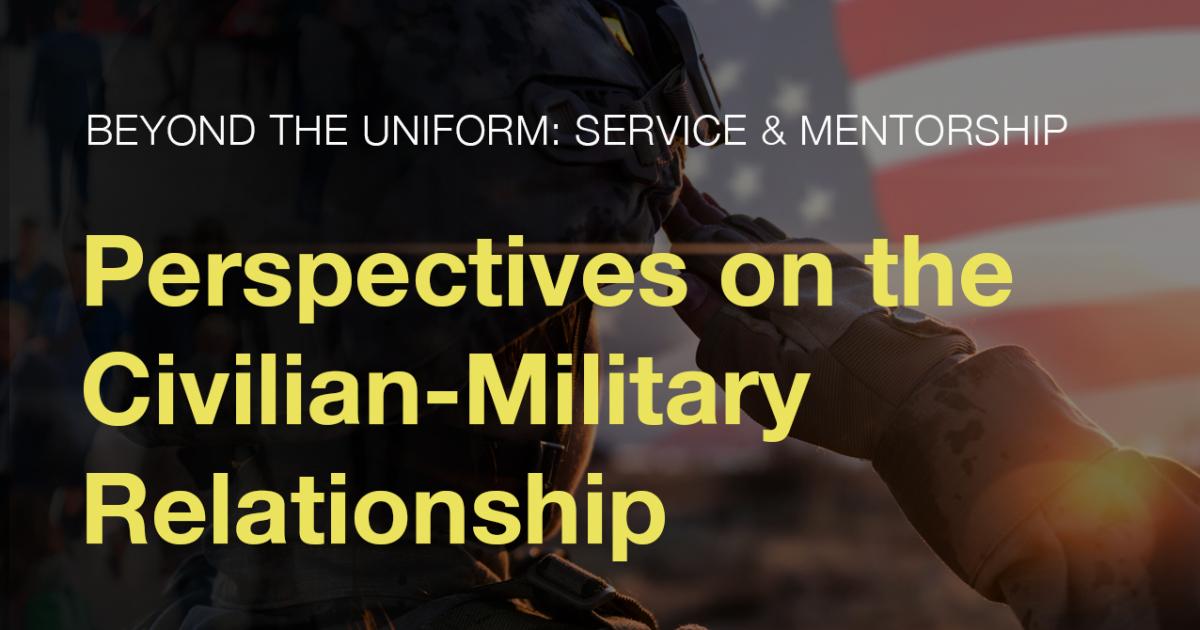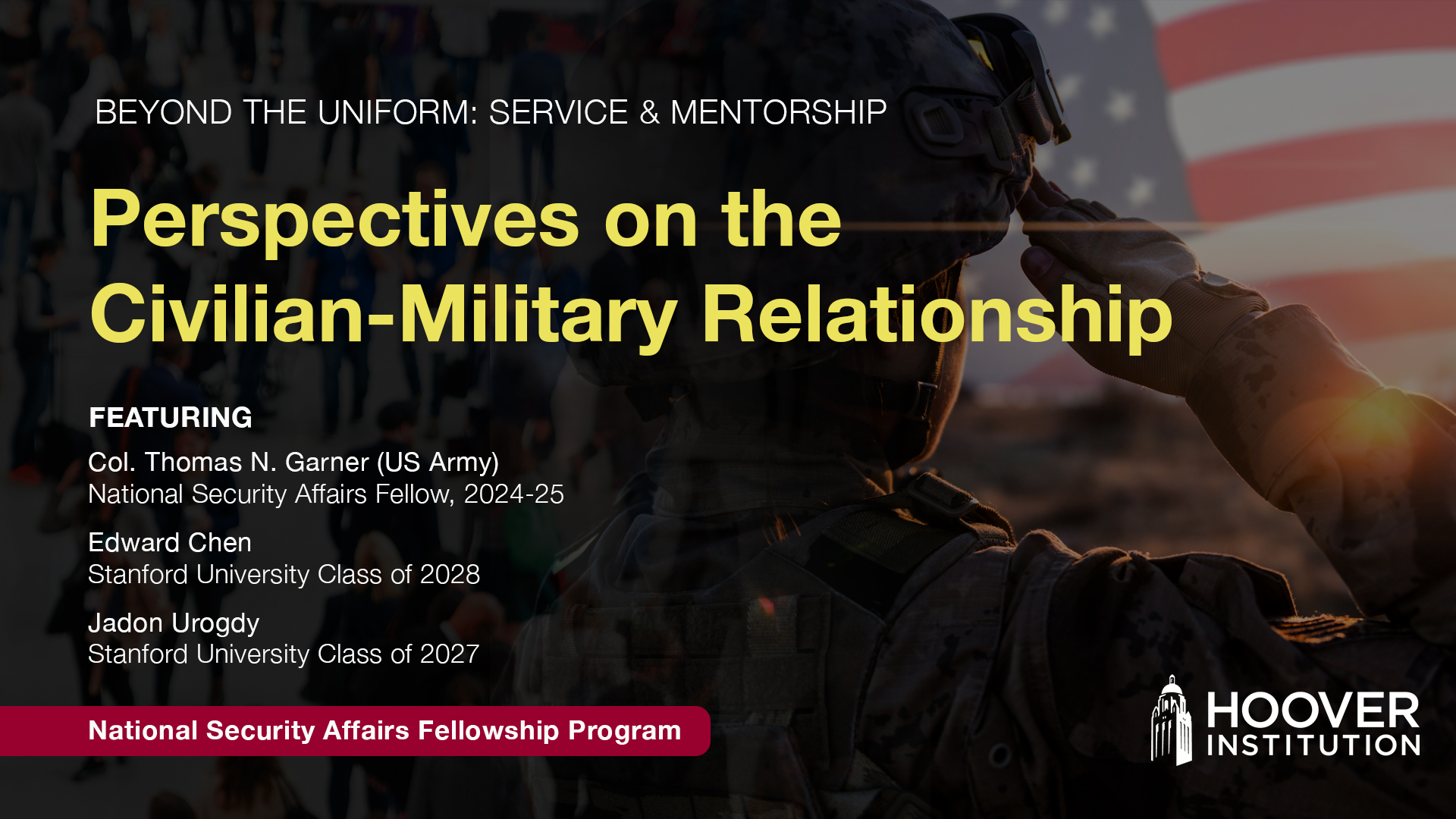Colonel Thomas N. Garner (US Army) and Stanford University students Eddie Chen and Jaydon Urogdy share their experiences during the NSAF Mentorship Program along with their insights on the importance of the civilian-military relationship in the United States.
WATCH THE VIDEO
>> Col. Thomas N. Garner: Students interested in national security or foreign policy are gonna face some challenges, at least in the way that the government structures its jobs. And so the personnel system is pretty rigid in terms of government roles, and it discourages movement in and out of the private sector and government roles.
And so because it values time in service as a reward for entering public service, it's difficult to take advantage of some of those academic or private sector opportunities that might emerge. And so I think we're breaking down some of those structural barriers, but it's still an impediment if you wanna be able to move freely back and forth.
So I think this program is valuable for civil-military relations because it offers different perspectives, both from the students to me and from me to the students. I often don't think of things because I'm so rigid in my thinking. With 21 years in the service, that your perspective is really refreshing for me.
It also builds trust too. You as potential future policymakers, get my perspective and the importance of what it means to be in public service as you integrate your own ideas into that realm. So going into this mentorship program, what I hope to achieve was not to give you answers but to give you a framework in which to think about these complex problems and issues.
And I've really been impressed with the way that you approach these things so that you have the tools in order to think about these things and not just the answers themselves. And so hopefully I've been able to accomplish that and give you some ideas about the way to think about problems and the way to think about things and give you more of an academically rigorous way to approach problem sets.
>> Edward Chen: The program itself is meant to be a way to connect NSAFs, officials from different agencies in the United States, as well as undergraduates at Stanford University. And I think it's a really special program to experience, especially as a student, because we're able to get a look inside how officials act in their day to day life in their agencies.
But the officials themselves are also able to get a look inside how we students live our lives at Stanford on campus every day.
>> Jadon Urogdy: Yeah, and I think what's so important about this program and what makes it really unique is that you do have that opportunity to be face to face with some of the governance that happens in the United States, right?
You have the leaders that make the policy decisions, that implement the policy decisions and that work behind the scenes that really are here for you to support you in your education into public policy and the political sphere. But also just to be a point of Support and a role model through your academic career.
So my mentor was Colonel Nate Garner of the US Army. And throughout the extent of the program, we worked together not only on a professional basis, where we reviewed policy and had an opportunity to learn more about what Colonel Garner does in his day to day life in the military, but also to spend time with the people around us.
With his wife Melissa, spending nights at the movies or eating dinner together and having conversations about what it means to grow up and what it means to graduate and to be successful in life. And I think in that way, this mentorship evolved from something that was. It started off as an opportunity to get to know somebody and really shifted into a point where we became family, where we trusted each other with what is meaningful to us.
And it gave us a better perspective on kind of growing up in this charged political environment. I think it was a great point of depolarization.
>> Edward Chen: My mentor was also Colonel Nate Garner. And to be honest, I was quite intimidated during our first meeting. I think especially like hearing that Colonel Garner was from the Army, he's really just top official.
And having never really interacted with any military officials. Our first meeting, I felt like I came in very intimidated at first. However, over the course of the entire year, our relationship really became more familial. As Jayden mentioned, we watched movies together, we went over to his house, met his wife Melissa, ate nachos, had a really fun time, cooked some salmon.
And I think these are the moments that really struck with me because those really showed that as at the end of the day, we're all human. We have these different moments that we can connect with, connect over. And that is what really is like the foundation of our relationship between the student and the mentor.
>> Jadon Urogdy: One thing that I learned about Colonel Garner is that he is a leader. And I say this in a way that is very abstract, but on the very first day that we met, you handed us this packet, which was Self Reliance by Ralph Waldo Emerson. And in this packet it talked about the importance of authentic leadership and how to communicate yourself and how to find that inner trust.
And I think that really speaks to who you are as a person and really helped us grow up together through this program and learn about what it means to not only be specific and intentional with the tasks at hand, something that Colonel Garner has practiced through his time in the US Army, but more so know how to trust yourself and embrace your own intuition.
And that's something that, as a student, that can kind of get lost because being overwhelmed and getting caught up in the day to day can really take a toll on you. But taking a step back and taking an opportunity to educate yourself was something that was really important to me.
And I believe Colonel Garner was very impactful in that aspect of my life.
>> Edward Chen: Yeah, I'd like to piggyback on that as well. I'd say Colonel Garner, his clarity, his leadership, and everything he does really inspires me. I remember one time, and, like, just throughout the year, I just, like, write down quotes that he'd say, like, even whether that's during classes or meetups.
But one time he said something to the. To the, I guess, essence of I'm not special. If every leader felt or heard that, then the world would be a better place. And I think that really struck with me because especially as leaders, many times we can feel as if we're like, the most important person in the room.
We're the ones that are leading. But when you lead from humility and when you learn or when you come from a place where you want to learn and uplift others around you, that is what really true leadership is, right? And really upholding and cultivating the community where everyone feels seen and heard and valued.
And I think that was really important, that value that he embodied, especially during his career, but also in the room and during our different conversations.
>> Col. Thomas N. Garner: Yeah, and this is really great to hear. Because one of the things that I see as a metric for success for me was to be able to tell both of you and to tell the other students that, at the end of the day, you have to be able to grant yourself or at least acknowledge the agency that you have in whatever situation that you're in.
Sometimes you can feel overwhelmed, especially with a bunch of Type A personalities here at Stanford trying to do the best that you can. You feel like a lot of things are out of your control when there's a lot that's within your control. And so that's great to hear.
>> Jadon Urogdy: I believe that my life has been impacted on an academic level and also a personal level through Colonel Garner's leadership. One night at dinner, we, you know, over nachos, we discussed the importance of taking a moment to step back and think about what have we learned in our lives this week.
And you brought that up, and I was pretty shocked by the question, because being at Stanford, all it seems like we do is learn. But it took me a moment to kind of think about that, and it was a struggle to figure out what I learned this week.
And approaching the idea of education through that level. And seeing how that it is not always a tangible thing. To derive some sort of knowledge from an experience. I think in that way, it helped us understand that we need to be more open and aware of situations. I think one thing that you said that really mattered to me.
Is that things don't have to be great to be worthy. Because it doesn't matter if a situation is going to be this amazing learning experience. But what it matters is that we do take a moment to step back, to reflect. And to understand what happened in that situation, how can we learn from it, and what the ultimate takeaway is.
And that is something that you taught me over. Over nachos on a Sunday night. So I appreciate that.
>> Edward Chen: Yeah, on the topic of learning, actually, during our first meeting, I remember Colonel Garner was saying how we will never be in a place like this again, where there's such a concentrated environment for learning, for growth, for constant curiosity.
And I believe that's a really important value for me to uphold as a student, especially like the idea of intellectual vitality. Where you're just learning just for the sake of learning. Where you're learning because you're interested, because you're curious, not because you want to get the grade, you want to get that job.
Or there's some other more like, nominal reason or motivation for it. And I think that has really stuck true to, like, the classes I'm taking right now. Where I'm really trying to always think about, think to myself, you know, am I having fun learning this, right? Is this something I'm interested in and how can I continue to pursue this, right?
Like, how can I continue being curious, researching outside of class, talking to the professors, meeting with the people around me. And just, like, making the most of my time here in a college at a place where everyone is so motivated to learn, ambitious, and has their own drive to do the things that they want to do.
And being in that environment has really continued to help me really enjoy the process as a freshman, especially in this university trying to explore what I want to do, who I want to be, and what I want to study specifically. And so having that curious mindset really helps with just having fun with the process.
>> Col. Thomas N. Garner: Jaden, what you forgot to mention was after I asked you what you learned that week, you pulled the UNO reverse card on me. And then you asked me what I learned that week. And I was really impressed with that question. And I thought you've gotta practice what you preach, and so it took me a little bit by surprise, but it was an awesome, awesome evening.
>> Jadon Urogdy: So Colonel Garner never hesitates to take an opportunity to educate. I think it was after we watched a movie about the Iraq war. In the car ride home, Colonel Garner took a moment to dissect every single inconsistency with the movie, down to the commands that were sent out by the personnel.
And I think that just embodies your character as somebody who is always looking for an opportunity to view a situation from a different angle. That's taught me a lot about leadership. I know we've had some conversations after class where it boiled down to me basically berating you with questions about leadership and how to be a better leader and what separates a good from a not so great leader.
And you always find an opportunity to look at that question and turn it into an educational moment. And I think that's something that I really revere about that.
>> Edward Chen: I really love Colonel Garner's commitment to making our experience through this class as good as it can be. I believe we as mentees have really made the most out of it and have gained a lot from you and from your teachings.
And so I think that has been really, really valuable for me as a mentee. But I think on top of that, what's most valuable for our relationship is that Colonel Garner really practices what he preaches in the sense that, like, he educates. He has a ton of different mindsets, frameworks that he uses to live through life, to lead through life, but he also embodies that in his day to day, how he shows up, his different actions.
I remember just like every time we meet up, we always, like, talk about, or I always hear him talk about, you know, the stuff that he's reading, the books that he's engaged in. Every day, he always takes time to read and really continue to learn and have that sharp mind.
And I think that's really important, especially as back on the previous topic of intellectual vitality. Always being a lifelong learning learner, and always trying to continue to grow and continue to fail. Try become a better person than who you were yesterday.
>> Jadon Urogdy: Yeah, I think, as we both mentioned before, this program, and specifically the mentorship experience between myself and the rest of my group and Colonel Garner, has been very impactful beyond the walls of the classroom.
Because it is a very intimate environment that is cultivated through this mentorship structure. And something that always sticks out to me is that in classes, while we might be in close environments, this is much different because it almost boils down to this family level of spending time together and getting to know one another.
It doesn't have to be something that's formal. It's actually quite informal. And being able to be more authentic and take time off from the stressful life that is college is really rewarding. It's great to spend a Sunday grilling salmon or a Tuesday afternoon watching a movie. Because in those moments, in those shared experiences that we get to spend together, those are the moments that we will take with us when we graduate.
Those are the moments where we get to learn for one another, to laugh with one another. And I think in that way that has really what's been transformational in my experience.
>> Edward Chen: Yeah, this has been way more than just a class. It's been really a learning experience, an opportunity for us to meet the officials outside of just their work, right?
Meet these, these people from these top agencies who are doing vastly important work. And again, we're like intimidating for me at first, but has been really a great experience for me to meet them on a human eye to eye level, right? Where I'm able to see what everyone, you know, what they like to eat, who they are as a person, how they talk, the jokes that they make during class.
Like, being able to like, see these officials for just like, just as human has been really eye opening for me. And every time I see something on news related to national security or if there's something on news that's related to an agency that's part of our class, I'm able to put a face to the name, put a face to the agency itself.
And again, outside of class, we've been able to meet up. I've been able to have lunches with different mentors and to meet up with also the different classmates that are from the different years. This class itself is for all four years of undergraduate. So there's people from freshmen like me to seniors.
And so it's been able to see how everyone's broad interests intersect and align through the entire year. Something I learned that was really valuable to me and very eye-opening was that within national security, the military is an apolitical entity within that, in a sense, that they aren't affiliated with any party, right?
Their duty as like the military, as the agency, is to carry out the different orders. And it's like through this democracy, the people vote for the different political affiliations of the country, of the government itself. But the military itself has always been an entity that carries out, that executes those orders, but should not be affiliated with a particular party.
I believe that's very important and a very important distinction to make, especially in today's politics. Because since the military is, I guess, like the firearm, the firepower of our country, it's really important that they be apolitical and they're more an entity that carries out the orders. Because that mindset, I think, is very important for the soldiers themselves to do the best job that they can do and without worrying about, does this align with my own personal values versus does this align with what I should do professionally?
>> Jadon Urogdy: Right, I think what many Americans don't realize is they don't necessarily see what goes on behind the scenes when a policy decision has been made. And to Eddie's point, there is a lot of apolitical behavior that happens, right? Because the behavior must be in the best interest of the United States.
And this program has really showed that because you have this governance structure of everybody from the intelligence community to the policymakers and the diplomacy actors, and then you also have the military that implements the policy in many cases. And to see all of these different agencies come together, not only in the classroom, but see it play out in real life has been a very fascinating experience.
To see that all of these agencies are interconnected and do their part, I think is something that has been very fascinating to me. Because while a decision retrospectively might not be or turn out the way we want it to, I think that it has still undergone so many different points of meticulous communication, has been in the best interest of the United States and has been carried out by the people we've been surrounded by for the past three quarters.
And I think in that way, this mentorship program has been very instrumental in my perspective of policy. And I believe that's something that all Americans should see and understand.
>> Edward Chen: What I found most surprising and interesting about how policy is crafted is that there's so many different, I guess, mechanisms that go on in the government that just have to keep on going, essentially, right?
So, for example, like the Presidential daily brief we were talking about in class, how for something like that, because international, different countries operate in different time zones, the government workers might have to be working, like at 4am in the morning in order to churn out the brief and for it to be ready for the President at the beginning of the day.
And so I think that's just an example and testament to how, like, how fast paced and how much work can be and needs to be done. But also, like, how, I guess, yeah, how fast paced the work needs to be and how quickly the people need to get stuff done and I was, like, reading.
We were reading HR McMaster's book for the class, and it was really impactful and inspiring to see all the stuff he did every day. And to me, especially, like, just, like, as a student, I was like, wow, it must be really tiring for an official just to be doing so much work every day to ensure that national security is upheld for a country.
And yeah, it's a lot of work, so really cool.
>> Jadon Urogdy: Exactly, yeah, policy, it has to be crafted very hastily. I think the other aspect of policy is that it, you know, as I said before, it needs to undergo multiple stages of communication among branches. And each agency, whether you're the Department of Homeland Security or the Department of State, all has separate roles in playing into that policy and its implementation.
And one thing that we did during the mentorship is that we split off into groups, sat down with a group of people, were all assigned roles, whether we were, you know, the Department of State or the President of the United States. And we all had to play our role that has a purview of what a situation might look like and kind of see how that would play out.
For example, we were given a paper with a simulation on it, something that happened abroad. And then our goal was to take that and translate that under the scope of what we do as an agency or department and translate that into effective policy to ensure the best interest of the United States.
So I think that gave me the best understanding of how that policy is crafted and what it would look like once it is played out.
>> Edward Chen: My understanding of civil-military relations has changed in the fact that, I've learned about how the families of military officials have to navigate the lifestyle.
One of the classes that we had, the different officials brought in their wives, their children, and they talked about how their life is different than, like, a normal, I guess, civilian life where you might just, like, live somewhere and stable and. And you stay there for the entirety of your childhood versus especially within military lives, lifestyles.
A lot of families have to move around. And I thought that was really inspiring and very impactful because, like, some of the families, some of the officials have, like, five or six kids. Like, they have a ton of children, but they're still able to make it work. And so that was really cool to see and how they're able to balance that, right?
And there's also, even though it is different, right, it's not necessarily detrimental in a sense. There's a lot of pros to it, there's a lot of benefits to it. Those families are able to see different worldviews, different perspectives around the world. They're able to travel the world, they're able to meet different people, be in different communities.
And I think that's been really cool. And I think it's both a sacrifice, but also a gift to those different families. But that's a really big, I guess, perspective that I learned throughout this year. And just talking to different officials, different NSAFs, and just learning about how their families navigate their lifestyles.
>> Jadon Urogdy: I think, to that point, exactly. I also do want to reference the class. I think that was the most impactful class in my experience was the one where we sat down with the significant others and children of these military personnel and got to hear their stories. How were they raised through this often-changing and uncertain environment?
How do they persevere, how do they adapt? And I think that, as you said, it is quite a sacrifice, but it is something that really demonstrates the character of themselves, who they are as a person. And I think it shows how we often look at the military and the individuals in them in these agencies on a more abstract level.
We hear them through the news, see them on tv, but we don't get to talk to them and ask them about their experiences. We don't see how it plays a role on their families and their lives. And to kind of already understand the lengths that these military officials have to go through, but also see what their family has to endure along with it, is something that has been quite shocking to me and something that really gives me a lot of respect for the military personnel and their family.
Because not only are they already serving the United States, but they're also in charge of serving their family and the people that they love the most. And that is a huge responsibility. I think a civilian military relationship is very important because it is crucial that we have policy that is created by those who represent who we are, the electorate and.
Having that policy that is not only in the best interest of the US as an idea, but more so as the US As a population is very important to have. So having people that are able to specialize in crafting this policy, but are also understanding and empathetic of our experiences and who we are, I think is really what is the genius of America.
>> Edward Chen: Just like add on to that as well. I think also within the civil-military relationship, it's really important to have civilians make these policies because they might be the ones that have spent their entire lives in those different communities and have understood the needs and the goals of the community, of the constituents.
And these military, I guess the civil-military relationship is also important to have that, to bridge that, I guess, that gap, because like the military themselves, they also have their own worldviews, their own perspectives on how different communities operate. And so they also have different perspectives that they can chime in on.
But their role and their perspective is different from a policy making perspective than these different civilians that have spent their entire lives in these different communities and understand the needs of their constituents.
>> Col. Thomas N. Garner: So my understanding of civil-military relationships has evolved over the course of this mentorship program.
Not just, I think it's difficult because it's something that I've lived and studied my entire life, but what's really been reinforced for me is the norms and reinforcement or at least re evaluation of those norms. As we move into these politically charged conversations and you try and remain apolitical, it gets more and more difficult with the pressures that the real world faces you with.
And being able to communicate that to students with the curiosity and intellectual understanding that you do was really a challenge for me. But it, like I said, I think it reinforced more than anything the importance of those norms that guide the behaviors between the civilian and the military relationships.
Because one, if the students don't understand fundamentally what that relationship is and what those guiding behaviors are and what's appropriate and what's not appropriate, then those are our future policymakers, potentially our future leaders. Both of you are our future leaders. And so having that, having the ability to be able to communicate what those norms are, why they're important, and why we remain apolitical is kind of how my views of civil-military relationship has evolved over the last year.
But yeah, I think norms is something that we all need to reinforce.
>> Jadon Urogdy: Yes, I think approaching policy and our policy goals comes from the understanding that we need to be able to take into account all aspects of what governance offers us. It comes from the FBI and the CIA, what intelligence do they collect?
Are they able to sift through the noise and pull out those signals? It comes from the elected leaders. Are they representative of the population? Are they listening to the population and have an opportunity to do temperature checks on what's important? It also comes from the military personnel, people like Colonel Garner.
Can they implement this policy in a way that will lead to the best interest of the United States? Can they do it in a safe fashion? Can they do it through leadership and in a way that will result in success? And I think all of those aspects play into what effective policy will look like.
And something that's in this charged environment can differ in many ways. And so kind of sifting through that polarization and pulling out shared interests and common interests, I think is what's really important.
>> Edward Chen: Yeah, this program has also helped me understand the different perspectives that you need to take into account when making these different policy decisions or just different actions in general.
One of the scenarios that we had, we are considering, if you're making this particular policy or setting forth this particular order or action, how can you consider the technological implications, the marketing, the public opinion, the public view of what you're doing? How this will affect other countries and what other countries are thinking?
Especially between hostile countries or allies, right, as well as just thinking about how this can have future implications in given sectors of our country, of society itself. And so being able to talk with officials of different agencies and understand their perspectives from security mindset, whether that's from the military or from the computational aspect of it, or from like FBI investigative aspect of it, is really important.
Because considering these different perspectives can allow us to have a more multidimensional view on the different actions we're trying to set forth.
>> Jadon Urogdy: I think this program has reaffirmed my interest in public service. I knew coming in that I wanted to get into politics in some form or another through the lens of public service.
However, I didn't really understand the implications that are at play when it comes to national politics. I think being a player, especially learning about how many moving parts that go into public service and the policy implementation phase is at play. I think that focusing my career on national politics and being a guide for the policy that is created through the United States is something that really sticks out to me as an interest.
>> Edward Chen: Yeah, it's like the topic of perspectives as well. This has helped me to take into account of national security perspectives and political perspectives. Especially in a university like Stanford, where stem, the sciences and engineering are heavily emphasized. It's really important to have that other aspect and to really consider those different perspectives.
I came in here really interested in climate and sustainability. And so being able to view that from a national security standpoint is really important. As we really determine over these next 25, 50, 100 years, how do different resources, different minerals, different, I guess, stakeholders and communities that are affected by climate change.
How is that viewed from a national standpoint, right? How can our country ensure that we can protect our civilians against the different effects, the disastrous effects, the catastrophes of climate change? And doing that from a national security standpoint is really important to see how, like the military debt policy, how that will affect change.
>> Jadon Urogdy: The most meaningful experience that I had during this mentorship program was Colonel Garner's colonel ceremony. During the ceremony, I had the honor of presenting Colonel Garner with his two silver eagles that he would pin onto his uniform. And that moment reminded me of my experience in Boy Scouts when I was getting to the rank of Eagle and when that silver eagle was pinned to my chest.
I think it really was a meaningful moment from that perspective, as it almost seems like all of Colonel Garner's work had culminated to this moment. However, Colonel Garner is somebody that is not caught up in the pomp and circumstance and the recognition of it all. I think he's somebody that sticks to his books, is somebody that is always looking for an opportunity to better himself.
And that is something that I really took away from that experience during that ceremony because I could see myself in his shoes.
>> Edward Chen: I find for me, the most valuable experience to be every meetup that we have, especially, I think, the first one, because that's what initiated the relationship in general.
Like I said before, being able to just understand and just be able to connect with Colonel Garner from human level has been really inspiring eye opening for me. Being able to grow from being so intimidated by meeting up with a top military official to just be able to chat with.
About life, about our studies, about different aspects of navigating college, of navigating our youth, right, has been really impactful for me. And now, succeeding this program, I know that he's someone that I can talk to. I can always text or call or just like meet up with again.
Throughout the course of my life, he's become like a lifelong mentor, a lifelong friend that I can really lean back on.
>> Jadon Urogdy: I think I am more optimistic about the future of the United States through the experience that I have had in the mentorship program. And I say that because through conversations with Secretary Condoleezza Rice, to looking inward and discussing between our mentors and the mentees, discussing maybe looming threats that have faced our nation, there might be a lot of pessimism.
There seems to be issues with the China overpowering the United States. There seems to be issues with polarization and how that plays as a threat to national security. I think looking back, I do feel a sense that we have a lot of work to do, but I also feel like there is optimism that rises out of that.
There's optimism that is more cautious. But there is hope that we can prioritize the issues that face our nation, that we have a better perspective on what we need to do and how to solve it. And I think being at Stanford gives us a great perspective on the technology at hand, the future of what we will be able to use to our benefits and what can also be used against us.
And this mentorship program has tied all of those ideas together and, and has left us with an understanding that we need to be hopeful but not complacent. And that will serve me very well in my future years in the public service sphere.
>> Edward Chen: Through this program, I felt really inspired and I've also appreciated the work that the officials have done a lot more.
Being able to understand the day to day lifestyles of what they do, the different stressful jobs that they have to take every day, and especially being able to hear the different story times that the officials tell about the day to day life has also been really eye opening for me.
And that has also just given me so much more respect for these different officials that are putting their lives on a line. That are really working day in, day out, minute by minute, to make these sacrifices for their families, for the country. And that I think has just shown that although we as a country have a lot of work still to do, there's a lot of stuff that we still have to do.
There's a lot of different directions we still need to take As a country, we're still putting in the work. And I think as long as we put in the work, we. We will get there, we will get to where we want to be as a country, and we will continue to grow.
>> Col. Thomas N. Garner: Yeah, I think over the course of the program, my perspective on some of the national security challenges have changed. Just based on your insights and your moral seriousness, the way that you approach some of these problems is just a different mindset than what I've had. I mean, I'm shaped obviously by my profession, my experiences in Iraq and Afghanistan, my own mentors within the military service who have a different way of thinking.
But the fresh perspective that you bring to some of these problem sets, the optimism that you bring to some of these really challenging, difficult situations, has made me think again about how I approach some of these things, rethink my own frameworks in order to approach some of these complex problems.
And it's given me, like I said, it's given me a renewed perspective and hope for what we have waiting for us in the future. Because I know that gentlemen like you, ladies and gentlemen that we've had in this class are exactly what we need to approach these problems with your mindsets.
So the way that my frameworks have changed as I approach national security is I feel like I have benefited just as much, if not more from this program than I think the mentees have. One thing that I value and I've tried to impart upon them, is the network and the value in having a network that you can reach back to.
It's not something that you do for personal gain, but it's something you do that can better this relationship of mutual trust that you can take forward with us. And so as I approach my next job, talking to the boss down there, I asked him, what challenges do you think you want me to tackle while I'm here for, I think, a year in order to get after some of these priorities?
And when he asked me what I could do, my first inclination was to come back and ask the students what they thought about what I should do about this thing. And so normally where I would look to another mentor, I'd sit down and start thinking critically about something.
I really wanted to get back here and figure out what your perspective was on it. And I think it's really shaped the way that I'm going to go about it. And so it's not necessarily that I'm going to continue to say, hey, how would Jayden think about this, or how would Eddie think about this?
But if I ever need it I can reach back, as you said, Eddie, and say, hey, what do you guys think about this problem, right? And that's the most valuable aspect. I think that I've changed in my approach to national security or other things really, to implement those ideas of what the future leaders should be.
And I don't understand why we don't do more of it. So I'm very confident that the future policymakers, the future leaders in the private and academic sectors, especially coming out of Stanford, I'm very optimistic that we're leaving our public policy, our national security, our leadership apparatus in good hands.
And so I taught cadets at West Point and I have my own biases and everything else in terms of discipline. Coming here to Stanford to say, what am I getting into? Our first meeting, you were intimidated. I was just as intimidated to figure out what Stanford students were all about.
But coming away from this, and I think I've told you this before, I was not expecting the level of self motivation and discipline that Stanford students have to achieve and do better. Whereas discipline is structured and forced at West Point and enforced often if people step out of line, it's amazing to see the dedication that each of you have to what it is that you want to pursue, even if you don't know what it is.
The curiosity that leads you, the discipline that makes you lock in and study late at night for some of these tests is really quite impressive. And it's manifest in the questions that you ask, it's manifest in the conversations that we have. And so I have the utmost confidence that not just you, but the other mentees in the program and students here at Stanford are exactly what this country needs for both the private sector, in the academic leadership community, and in the public service.
>> Edward Chen: I think something that's been really impactful and really special about the program itself is that each quarter we're able to hear from different speakers that are now within the political public service sector. For example, in the fall quarter, we had HR McMaster, a former national Security advisor.
And so within his talk specifically, something that really stood out to me was that was his mindset of stoicism. Where he really upholds the value of doing playing well the role that's assigned to him. And especially as a national security advisor who had to stay on top of it every minute of every day and really adapt to different changes across time zones, across different countries, across live news, right?
It was really inspiring to hear him talk about his own mindsets, his own frameworks, and how he really approaches that. And I think that's really special about the program. Because not only are we talking with these different top officials and reading about these different scenarios, but also, we're also being able to look into the day-to-day lives of these top officials and be able to see how they operate.
>> Jadon Urogdy: So I think that one of my favorite takeaways from this mentorship program are the speaker series where the mentors have the opportunity to give a story at the end of every class and hearing every single mentor describe what their job looks like. Maybe on a bad day, maybe it's one of the best days they've had on the job.
But nonetheless still portraying a sense of what they do in their lives. It was very monumental to my understanding of not only what the jobs look like, but also what they feel, their emotions that they experience when they're on the job, what they want out of it, what they desire, mistakes that they have made, lessons that they have learned, and how they have adapted and improved.
I think those opportunities to step back, and while we might read about it on The New York Times, where we might listen to it on CNN, I think that that is one aspect, one way of looking at an agency and the people within it. But I think hearing about it on a personal level, on an individual level, I think is really what has shaped my understanding of, of what it means to be a public servant, Somebody who is not always respected, who is often overlooked, but somebody who deserves the recognition.
Somebody who plays such an impactful role on the future of the United States. I think in that way, those opportunities, that 20 or so minutes at the end of every class has been what has changed my perspective about public service in the United States.
>> Col. Thomas N. Garner: So what's really special about the National Security Affairs Fellow program and also this mentorship class in the public policy 100 is that you have representatives from every single branch of military service.
But more importantly, we also have representation from the State Department, the CIA and the FBI, which is one gives you a different perspective on public service. But also I think it highlights for all of us, not just in the military service, but also the students, the similarities between public service, whether it's as a government civilian or public service in a military uniformed role.
And so I got a lot out of it with our brothers and sisters from the State Department, the FBI and the CIA. Not only the common bonds that we share, as you pointed out, you know, our families go through very similar things. I think our state NSAF lived in about seven different countries, you know, two year assignments, much very similar to the military.
But more importantly, I think it showed kind of a unified perspective to the students to show that it doesn't matter if you're, if you're in uniform or if you're not. We're all kind of working towards the same purpose and, and there's value in.
ABOUT THE FELLOW & MENTEE
Colonel Thomas N. Garner is a national security affairs fellow for the academic year 2024–25. Garner previously served as the operations officer, G3, for First Armored Division and Fort Bliss. Commissioned as an armor officer in 2004, he served in leadership and staff positions, including tank platoon leader and combined arms battalion commander, with deployments to Iraq, Afghanistan, and the Republic of Korea.
Edward (Eddie) Chen is a rising sophomore at Stanford University studying Energy Science & Engineering and International Relations. Through the Hoover National Security Affairs Mentorship Program, he is mentored by Colonel Garner, who has taught him invaluable leadership skills that continue to cultivate his intellectual vitality. As a United Nations Youth Delegate, he is passionate about community disaster preparedness towards energy reliability and will be interning at the California Energy Commission over the summer under Commissioner Noemi Gallardo to develop California’s Lithium Valley Vision. Outside of academics, Eddie is a United States Presidential Scholar in the Arts and heavily involved with Stanford’s dance community, sharing his passion for Hip Hop dance to communities in California and Taiwan.
Jadon Urogdy is a student at Stanford. He is interested in domestic policy issues related to sustainability, voting rights, and education. He dove into policy research related to environmental justice, strategic executive aggrandizement, and avenues for equitable academic achievement. He is seeking rigorous opportunities in politics, policy, and law.







